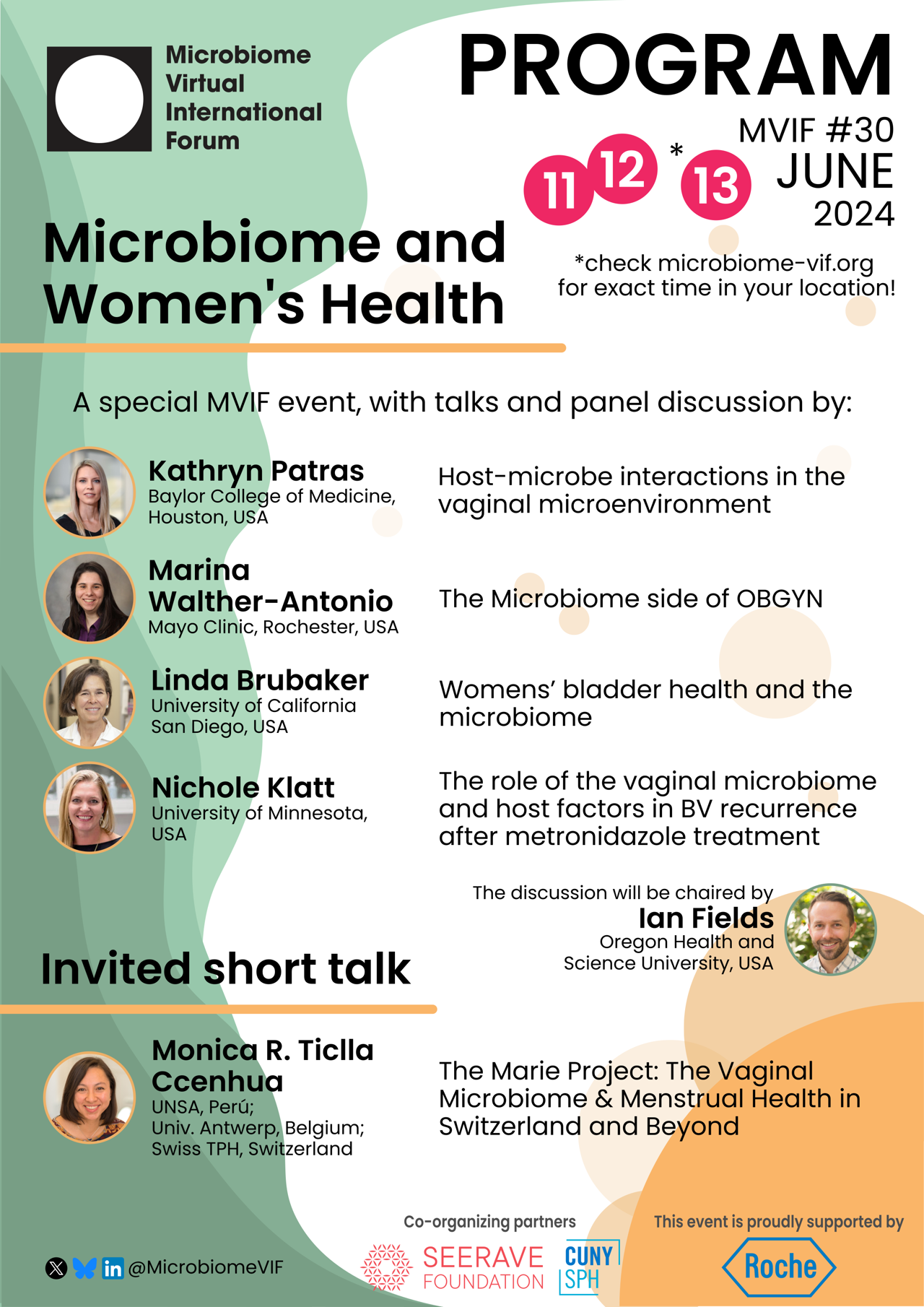Microbiome and Women's Health
A special MVIF event, with talks and panel discussion by:
- Kathryn Patras - Baylor College of Medicine, TX
- Marina Walther-Antonio - Mayo Clinic in Rochester, MN
- Nichole Klatt - University of Minnesota, MN
- Linda Brubaker - UCSD, San Diego, CA
The discussion will be chaired by Ian Fields - Oregon Health & Science University, OR
Abstracts and speakers’ bios are available below.
Panel talks
Host-microbe interactions in the vaginal microenvironment
by Kathryn Patras, Alkek Center for Metagenomics and Microbiome Research, Baylor College of Medicine, Houston, TX USA
Summary: This talk will summarize current efforts of the Patras lab to establish preclinical models of the vaginal microenvironment and assess the functional role of the vaginal microbiota in the context of a variety of host states including health, pregnancy, and diabetes.
Bio: Katy Patras is an Assistant Professor at Baylor College of Medicine with appointments in Molecular Virology and Microbiology and the Alkek Center of Metagenomics and Microbiome Research. The goal of her research program is to study host-pathogen-microbiota interactions in the urogenital tract with a particular focus on group B Streptococcus and uropathogenic E. coli. Her group uses newly developed models to study why individuals with certain conditions, such as pregnant or diabetes, are more susceptible to urogenital infection, to test novel therapies, and to establish the functional role of the urogenital microbiota with ultimate applications to both disease pathogenesis and overall human health.
The Microbiome side of OBGYN
by Marina Walther-Antonio, Mayo Clinic in Rochester, MN, USA
Summary: We will do a recap of our microbiome work in Obstetrics and Gynecology, starting with our findings in healthy populations and natural variation. Then transitioning to healthy obstetrics and preterm labor. And wrapping up with gynecologic cancers, particularly endometrial and ovarian cancer.
Bio: Dr. Marina Walther-Antonio is an Associate Consultant in the Department of Obstetrics and Gynecology with a joint appointment in the Department of Surgery, and affiliation with the Microbiome Program, within the Center for Individualized Medicine at Mayo Clinic, Rochester, MN. Her scientific education started with a B.S. in Biology from Universidade de Aveiro (Aveiro, Portugal), M.S. in Microbiology from Indiana University (Bloomington, IN), and Ph.D. in Environmental Sciences and Natural Resources from Washington State University (Pullman, WA). The scientific research was centered on astrobiology topics - study of origin and evolution of life on Earth and search for life elsewhere. This was followed by a postdoctoral fellowship at Mayo Clinic, transitioning evolutionary and ecological concepts and approaches to the medical realm, with the subsequent establishment of a research program focused on basic and translational applications of the microbiome role in human health and disease, particularly endometrial and ovarian cancer. Dr. Walther-Antonio currently serves as the Associate Dean for Diversity, Equity, and Inclusion at the Mayo Clinic Graduate School of Biomedical Sciences, co-Chair for the Associate Consultant Council, Director of the Leadership in PhD program (LeaP), and Associate Director for Clinical and Translational Sciences.
Womens’ Bladder Health and the Microbiome
by Linda Brubaker, Clinical Professor Department of Obstetrics, Gynecology and Reproductive Sciences University of California San Diego, USA
Summary: In the decade following the discovery of the urobiome, more than 14000 urobiome genomes have been contributed to Greengenes2, facilitating rapid expansion of our understanding of the urobiome in various bladder health states. This presentation will highlight ongoing research designed to correlate bladder health and the urobiome.
Bio: Linda Brubaker, MD, MS is a board-certified FPMRS specialist at the University of California San Diego. She convened the first UROBIOME conference in 2019 and has led development of the first scientific consensus statement for urobiome researchers. She is the Consortium Chair and a PI for the NIDDK Prevention of Lower Urinary Tract Symptoms (PLUS) Research Consortium. Her current research focus is the human urobiome, recurrent UTI and bladder health. She is also a Senior Editor for JAMA and the Editor in Chief for the Journal of Urogynecology (formerly called FPMRS). Dr. Brubaker has an illustrious academic profile, including service as the Dean of the Loyola University Chicago Stritch School of Medicine for nearly 6 years and the Interim Department Chair for Obstetrics, Gynecology and Reproductive Sciences at UC San Diego. Dr. Brubaker has received multiple awards which include the Lifetime Achievement Award (American Urogynecologic Society), induction into AOA (2013), Alpha Sigma Nu, the Jesuit Honor Society, the 2007 APGO Excellence in Teaching Award, the 2003 Rush Medical College Distinguished Alumnus Award and the various Faculty Teaching Awards. She has served as the president (and program chairs) of both the American Urogynecologic Society as well as the Society of Gynecologic Surgeons as well as the Division Director for the FPMRS division of ABOG. At UC San Diego, Dr. Brubaker is currently serving as the Interim Director of Physician Wellness.
The role of the vaginal microbiome and host factors in BV recurrence after metronidazole treatment
by Nichole Klatt, University of Minnesota, MN, USA
Summary: Bacterial vaginosis (BV) is an inflammatory condition caused by an overgrowth of anaerobic bacteria that often recurs after treatment and is associated with adverse reproductive health outcomes. Clinical criteria such as Amsel or Nugent scores are used for diagnosis, but molecular methods offer more comprehensive bacterial understanding. This six-month longitudinal study explores the relationship between vaginal microbiome, transcriptomics, and cytokine profiles to understand the interplay between host factors, the microbiome and recurrent BV inflammation after treatment.
Bio: Dr. Nichole Klatt is Professor and Chief of the Division of Surgical Outcomes and Precision Medicine Research in the Department of Surgery, University of Minnesota. Prior to this she was an associate professor, vice chair of research, and the Adrienne Arsht Endowed Chair in Pediatric clinical research in the Department of Pediatrics, Miller School of Medicine, and Sylvester Cancer Center of University of Miami from 2018-2020. Dr. Klatt was also an associate professor in the Department of Pharmaceutics at the University of Washington from 2012- 2018. Dr. Klatt received her PhD from Emory University in Immunology and Molecular Pathogenesis in 2009, and was also a visiting PhD candidate at the University of Pennsylvania from 2006-2008. Dr. Klatt performed her postdoctoral research in the Laboratory of Molecular Microbiology at the National Institutes of Health from 2009-2012. The goal of Dr. Klatt’s research laboratory is to understand mechanisms of microbiome, mucosal dysfunction and drug metabolism to improve human health.
Discussion
chaired by Ian Fields, Oregon Health and Science University, OR, USA
Bio: Ian Fields, MD, MCR is an Assistant Professor of Urogynecology at Oregon Health & Science University in Portland, Oregon. In addition to his clinic role, Dr. Fields is also Program Director of the Obstetrics & Gynecology Residency at OHSU. Dr. Fields has extensive background in cell and molecular biology research and has spent time investigating the role of the vaginal and urinary microbiomes in the pathophysiology of lower urinary tract disorders.
Short invited talk
The Marie Project: The Vaginal Microbiome & Menstrual Health in Switzerland and Beyond
by Monica R. Ticlla Ccenhua, Universidad Nacional de San Agustín de Arequipa, Arequipa, Perú; University of Antwerp, Antwerp, Belgium; Swiss Tropical and Public Health Institute, Basel, Switzerland
Abstract: Isala started in 2020 with more than 6000 women in Belgium willing to learn about their vaginal microbes and their relationship with their health. Today, Isala has inspired more than ten projects in other countries, united under the mission to improve women's health through investigation of the vaginal microbiome. This talk presents Marie, the Swiss sister project, and the first official collaboration between projects from the Isala sisterhood: Laura, Leke, Marie, and Isala. This collaboration interlinks fundamental biomedical research with social sciences methodologies to generate research evidence on the impact of menstrual products on the vaginal microbiome, complemented with women’s views, perceptions, and concerns about menstrual health management. Hand in hand with international policymakers, local organizations and the private sector, the four sisters want to bring knowledge of the impact of menstrual products on the vaginal microbiome to the current agenda on menstrual health.
Link: https://isala.be/en/the-isala-sisterhood-lets-write-history-together/

